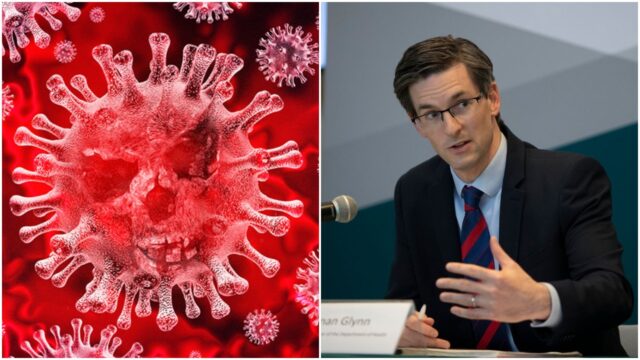There have been a further eight Coronavirus-related deaths and 4,929 new cases, according to figures released by the health authorities today.
63 of the new cases are in Laois, meaning the county’s 14-day incidence rate goes to 911.5, up from 843 yesterday. The national 14-day rate now stands at 1,379.
There are now 772 confirmed active cases in the county, again a record high.
Of the cases notified today:
- 2,250 are men / 2,641 are women
- 59% are under 45 years of age
- The median age is 39 years old
- 1,513 in Dublin, 695 in Cork, 320 in Limerick, 305 in Wexford, 225 in Galway and the remaining 1,871 cases are spread across all other counties.
As of 2pm today, 1,582 COVID-19 patients are hospitalised, of which 146 are in ICU. 156 additional hospitalisations in the past 24 hours.
Dr Tony Holohan, Chief Medical Officer, Department of Health said: “While we are seeing the first glimmer of hope in respect of our daily case figures and positivity rates, the situation in hospitals and ICUs around the country continues to worsen day on day. We know that hospitalisations occur some weeks after a confirmed case is notified, and mortality after that again.
“That means we are unfortunately set for a period of time where the situation in our hospitals gets worse before it gets better.
“The best way forward now is for all of us to stay at home. Staying at home and cutting your contacts right down to only those in your immediate household is the one vital way we will protect our healthcare system as it struggles with the burdens brought on by this surge in COVID-19 infections.”
Dr Michael Power, HSE Clinical Lead for Intensive Care, said: “Over the past weeks, we have seen a swift and sharp spike in admissions into critical care units across the country. As of this morning, we have 146 people sadly in ICU. This is nearing the springtime peak of 155 people in critical care.
“The potential long-term impacts on these patients’ health is stark and significant. ICUs are not where we want anyone to be. They are our very last line of defence against COVID-19. The best way we can protect our ICU capacity and those that work in them is to stay at home.”
Professor Philip Nolan, Chair of the NPHET Irish Epidemiological Modelling Advisory Group said: “The alarming level of disease is unprecedented in terms of our experience of the levels of COVID-19 in the community. We are seeing numbers of cases per day, and numbers in hospital, that we just could not have comprehended prior to Christmas.
“The tools to address this accelerated growth rate are in our hands and we know from experience how we can significantly suppress transmission of the virus.
“We are beginning to see the first signs of the impact of the latest public health measures, with test positivity falling and case numbers starting to stabilise, but this will only continue if every one of us is committed to following the public health advice to stay at home and work from home as much as possible. This is vital in order to make significant headway over the next 7 days and to reduce the pressure on our health services and healthcare colleagues”.
Dr Cillian De Gascun, Medical Virologist and Director of the National Virus Reference Laboratory said: “Further testing of COVID-19 samples indicates that the UK variant continues to account for an increasing number of cases– more than 40% of the positive cases tested in the last 7 days can be traced back to this variant. The greater risk of infection posed by this new variant increases the risk of transmission of the disease in the community.
“Now, more than ever, there is an urgent need for vigilance in our individual response to the disease, which is spread through close proximity to others. This virus cannot spread when households do not mix together, when social gatherings do not occur and when people stay at home for all but essential reasons.”
Professor Karina Butler, Chair of the National Immunisation Advisory Committee said: “The roll out of the COVID-19 vaccine programme is underway. The recent authorisation of the 2nd COVID-19 vaccine for Europe, Moderna, and the latest news on the Astra Zeneca approval process gives us cause for hope for rapid community vaccination against COVID-19 in coming months.
“Every time we wash our hands, wear a face covering and keep a two metre distance from others, we are protecting the most vulnerable in our society and our frontline healthcare workers and giving all of us much needed additional time for more vaccines to be administered.”
New Cases in Laois
- January 10 – 63
- January 9 – 105
- January 8 – 6
- January 7 – 55
- January 6 – 82
- January 5 – 107
- January 4 – 12
- January 3 – 80
- January 2 – 40
- January 1 – 104
- December 31 – 12
- December 30 – 50
- December 29 – 23
- December 28 – 38
- December 27 – 5
- December 26 – 2
14-day case rate in Laois per 100,000 population
- January 10 – 911.5
- January 9 – 843
- January 8 – 722.6
- January 7 – 742.6
- January 6 – 689.5
- January 5 – 606.9
- January 4 – 493.5
- January 3 – 494.7
- January 2 – 406.2
- January 1 – 381.4
- December 31 – 271.6
- December 30 – 269.2
- December 29 – 237.3
- December 28 – 225.6
- December 27 – 186.5
- December 26 – 190.6
New cases in Laois during past 14 days
- January 10 – 772
- January 9 – 714
- January 8 – 612
- January 7 – 629
- January 6 – 584
- January 5 – 514
- January 4 – 418
- January 3 – 419
- January 2 – 344
- January 1 – 323
- December 31 – 230
- December 30 – 228
- December 29 – 201
- December 28 – 191
- December 27 – 158
- December 26 – 161
Ireland has highest Covid-19 rate in the world
Ireland now has the highest daily number of new confirmed Covid-19 cases in the world for every million people, according to figures published by the Our World in Data organisation.
Ireland’s seven day rolling average is 1,394 cases per million – ahead of the UK on 810, Portugal on 735 and the USA on 653.
The research website is linked to Oxford University.
























